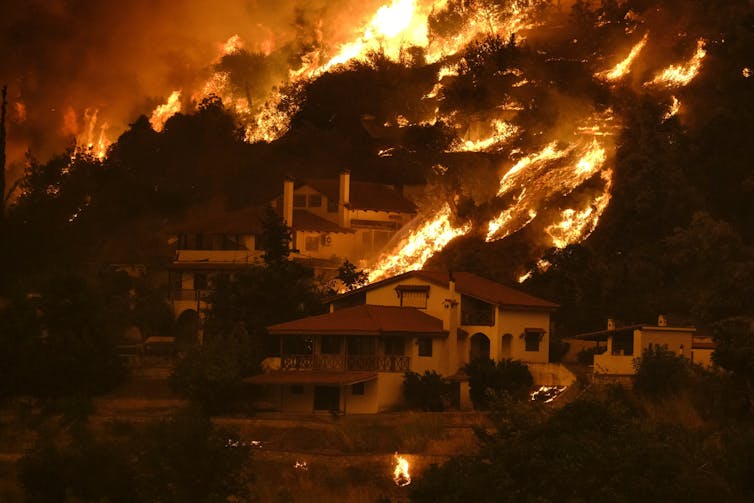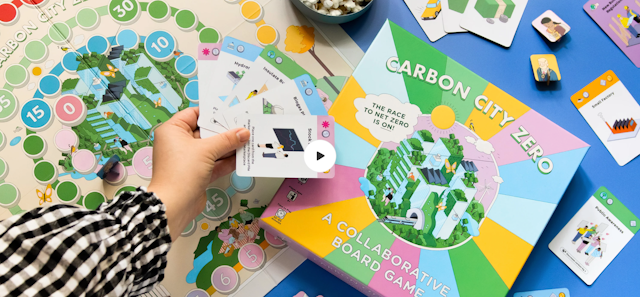The dangerous wildfires burning across Europe show us how real the climate crisis has become. When we see these disasters on the news, it’s clear we need to take action on climate change now. But it can still be hard to really understand how. That’s where tabletop games can help.
Tabletop games (board games, card games, role-playing games – anything that can be played around a table) have a unique ability to engage players in complex systems. Experiencing a scary imaginary future in a game can inspire players to take action in the real world. Games engage our brains in a different way than just hearing news about climate disasters. And they can prepare us to make better choices.
It’s similar to how Dungeons & Dragons pulls you into an imaginary magical world. Climate crisis games pull you into possible futures where our real-life choices shape our current and future climate.
Board games like the soon-to-be-launched Daybreak, and CO₂: Second Chance and card game Tipping Point introduce players to the effects of the climate crisis, forcing them to adapt their strategies to survive and thrive. They also foster dialogue, providing a shared experience that players can discuss, debate and learn from.
As a game designer and academic working in the sphere of science communication, I have a unique perspective on the intersection of gaming and the climate crisis. My work in designing games such as Carbon City Zero and Catan: Global Warming has provided me with valuable insights into the power of games as tools for communication and education.
While digital and online games such as Horizon: Forbidden West and Terra Nil are also a powerful way of generating conversations about the climate crisis, the very act of getting around a table to play tabletop games means they create a more immediate opportunity for actually talking and collaborating.

Education and motivation
When we started designing Carbon City Zero in 2018, my fellow gamemaker Paul Wake and I worked with charity and climate experts Possible. Our goal was to make a fun game that could also help players understand the complicated problem of climate change.
In the game, players have to make some tough choices. Like choosing between energy sources that are cheaper right now versus ones that are better for the environment long-term. We also added event cards about topics such as misinformation and greenwashing – when companies make misleading claims about the green credentials of their products or practices while hiding unsustainable activities.
Throughout the game, players see how choices they make affect the environment over time. They have to try to steer their city to zero carbon emissions. This helps them feel the challenges of fighting climate change in a hands-on way.
Possible worked with us to facilitate development sessions with climate scientists, activists, industry representatives and policymakers. We could then use this expertise and experience to make a game that simulates the real, tough trade-offs and chain reactions of climate change. We wanted players to grasp climate issues by experiencing them first-hand, not just hearing about them.
Similarly, with Catan: Global Warming, we sought to introduce the impacts of the climate crisis into the familiar framework of a popular board game (by 2020, more than 32 million copies of Catan had been sold in 40 languages). This allowed us to reach a broad audience and spark conversations about the climate crisis in a new and engaging way.
Through these experiences, I’ve seen firsthand how games can inspire players to learn about the climate crisis and motivate them to act. As we face the urgent challenges ahead, I believe that such games can play a crucial role in fostering understanding, dialogue and action.
The ‘magic circle’ and climate action
In gaming theory, the “magic circle” refers to the psychological space where the normal rules and realities of the world are suspended and replaced by the game’s artificial reality. This concept allows players to experiment with different strategies and outcomes without real-world consequences.
In the context of the climate crisis, the magic circle can serve as a powerful tool. It enables the simulation of climate crisis impacts and the testing of various strategies to help reduce those impacts. Games also offer unique opportunities for roleplay, allowing players to assume different characters and experience the world from different perspectives. This can foster empathy and understanding around the climate crisis.
For example, in Tipping Point, players are tasked with constructing cities while simultaneously navigating extreme weather events. This mirrors the real-world challenge of maintaining environmental equilibrium in the face of escalating resource consumption.
Games as catalysts for action
Games can serve as a potent tool for instilling the notion of taking effective action when it comes to climate issues. They transform the abstract concept of the climate crisis into a tangible and immediate experience. They encourage creative problem-solving, presenting challenging scenarios that require innovative solutions. Crucially, games create a sense of agency, showing players that their actions can make a difference – especially when they combine their efforts.
In the collaborative game Daybreak, for example, each participant steps into the shoes of a distinct global entity – be it China, Europe, the US or the global north. The shared objective is straightforward yet challenging: strive to achieve zero emissions before the planet warms by 2°C, or before too many of your communities are plunged into crisis.
By exploring these fast-approaching realities, games can motivate players to come up with real-world climate solutions, and to really think about how personal and collective actions can contribute. Playing the game fosters a cooperative mindset that players can carry into the real world.
Examining this intersection between gaming and climate action is not merely an academic exercise, but a practical tool I believe can play a significant role in our collective response to the environmental challenges we face.

Don’t have time to read about climate change as much as you’d like?
Get a weekly roundup in your inbox instead. Every Wednesday, The Conversation’s environment editor writes Imagine, a short email that goes a little deeper into just one climate issue. Join the 20,000+ readers who’ve subscribed so far.

